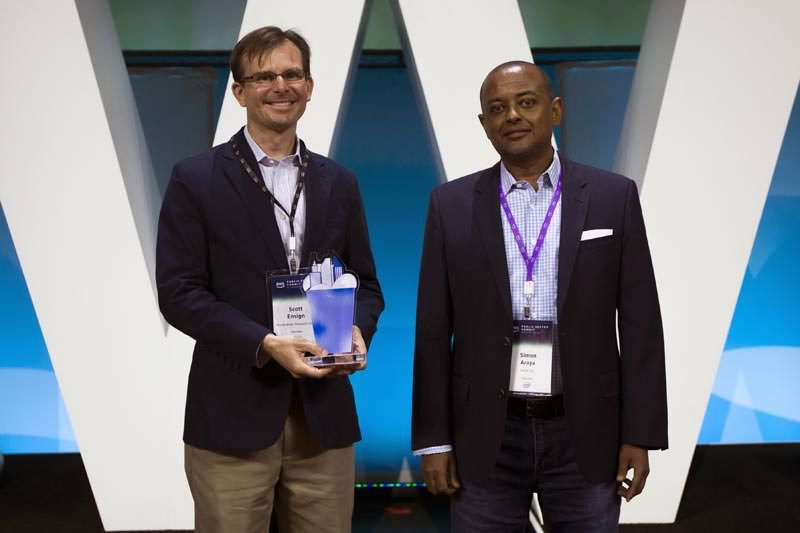Amazon Names the Stroud Center’s Model My Watershed a “City on a Cloud Innovation Challenge” Winner
Published on by Water Network Research, Official research team of The Water Network in Non Profit
Amazon Web Services has announced Stroud Water Research Center — a global leader in the advancement of knowledge and stewardship of freshwater systems — is a 2018 winner of the City on a Cloud Innovation Challenge.
Winners were announced at the Walter E. Washington Convention Center in Washington, D.C., during the AWS Public Sector Summit June 20-21.

The Stroud Center was one of three winners in the Partners in Innovation category, along with Utility Associates and University of Münster. Stroud Center Assistant Director Scott Ensign (left) and Simon Araya from Utility Associates are shown accepting the award on behalf of their institutions.
The Stroud Center was one of three winners in the Partners in Innovation category and will receive $25,000 in AWS promotional credit to continue its project. Partners in Innovation Award winners are technology partners who have deployed innovative solutions to solve government or teaching and learning challenges.
Model My Watershed®, the Stroud Center’s winning project, is an easy-to-use, professional-grade watershed modeling and data discovery web application that enables citizens, conservation practitioners, municipal decision-makers, educators, and students to learn about their watersheds and the impact of stormwater runoff in their neighborhoods. It’s one of six tools in the WikiWatershed® toolkit available at https://wikiwatershed.org.
It is a collaborative project led by Stroud Water Research Center and produced in partnership with LimnoTech, Penn State University, the Academy of Natural Sciences of Drexel University, Utah State University, University of Washington, Azavea Inc., The Concord Consortium, and Millersville University and funded by the William Penn Foundation and the National Science Foundation.
How It’s Used
Users select a geographic extent, analyze real land use and soil data, model stormwater runoff and water-quality impacts, compare how different conservation or development scenarios modify runoff and improve water quality, and share their findings with others. Users can also access and visualize monitoring data from national data repositories, as well as explore water flow paths and erosion potential, nutrient hotspot modeling, and multi-regional runoff and water quality comparisons.
Planners, town councils, conservationists, and policy-makers use the application to make informed decisions on zoning and land use and to visualize the impact of storm runoff. Secondary school students and teachers use it to learn geospatial analysis, systems approaches to problem solving, and watershed processes.
Its code was released under an open-source license in a set of GitHub repositories, which allows the software to be used for other purposes. For example, the Model My Watershed framework was adapted by a group of researchers to build a pollinator modeling software system that enables farmers and agricultural researchers to test scenarios for how changes in land use will affect pollinators.
Model My Watershed has already made a positive impact on communities and watersheds across the United States, thereby improving the quality of life for local citizens. A recent Watershed Academy webinar by the U.S. Environmental Protection Agency highlighted the use of Model My Watershed by several states and others for their total maximum daily load, nonpoint source, and municipal stormwater programs.
Accolades
- As part of the larger WikiWatershed project, the Model My Watershed software received the 2017 Governor’s Award for Environmental Excellence by the Pennsylvania Department of Environmental Protection for representing the very best in innovation, collaboration, and public service in environmental stewardship.
- Model My Watershed was a 2018 finalist for Philadelphia’s Sustainable Business Network’s Green Stormwater Infrastructure annual award.
- Global Grid recently recognized WikiWatershed.org as a top Civic Tech Website for Urban Planners and City Makerslisted under their Public Services and Open Tools category.
- It was used by a Colorado middle school to win a national competition in the land and water category by helping students to demonstrate the incremental impact of population and development on their local ecosystem.
- It has been recognized by the Community for Advancing Discovery Research in Education as an important tool for science education.
About Stroud Water Research Center
Stroud Water Research Center seeks to advance knowledge and stewardship of freshwater systems through global research, education, and restoration and to help businesses, landowners, policymakers, and individuals make informed decisions that affect water quality and availability around the world. Stroud Water Research Center is an independent, 501(c)(3) not-for-profit organization.
About City on a Cloud Innovation Challenge and AWS
Through the City on a Cloud Innovation Challenge, Amazon recognizes local and regional governments as well as private and public schools and districts as hubs of innovation in four categories: Best Practices, Partners in Innovation, Dream Big, and We Power Tech.
AWS helps businesses, nonprofit organizations, local and regional governments, schools, and districts innovate by simplifying IT workloads that they struggle with and depend on every day, such as Geographical Information Systems (GIS), Content Management Systems (CMS), Open Data portals, teaching and learning solutions, and more. All of these applications run on AWS and make it easier for governments and schools to deliver services to their customers, citizens, and students.
Source: Stroud Water Research Center
Media
Taxonomy
- Water Resource Management
- Ecosystem Management
- Ecosystem Management
- Freshwater
- Natural Resource Management
- Water Resource Management
- Fresh Water Ecology